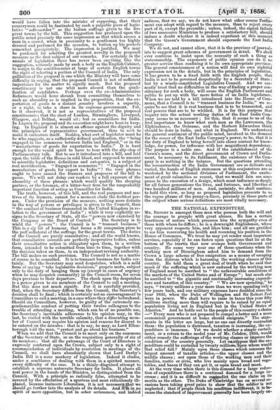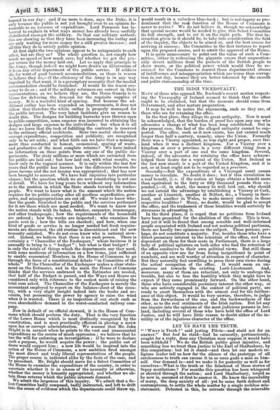THE NATIONAL EXPENDITURE.
Mn. Burcarr is amongst those men who possess both the will and the courage to grapple with great abuses. He has a certain heartiness of nature which procures him the sympathy even of those with whom he differs ; he is a downright Englishman, whose very opponent respects him, and likes him ; and all are gratified to see him recovering his health and resuming his position in the House of Commons. We trust he may yet render most important services, especially if he can fasten upon questions that lie at the bottom of the inertia that now cramps both Government and country. He came very near one of those questions when the working men of Birmingham asked him to demand from the Crown a large scheme of free emigration as a means of escaping from the distress which is harassing the working classes of this country. He told them a great deal of truth when he said that much of the suffering which is now endured by the working men of England must be ascribed to "the unfavourable conditions of the markets of the United States and of Europe " ; but much also he ascribed to "the gigantic and continually increasing expendi- ture and taxation of this country." "We are now spending," he says, "twenty millions a year more than we were spending only a few years back, and our military expenses have doubled since the year 1835, when the Duke of 'Wellington and Sir Robert Peel were in power. We shall have to raise in taxes this year fifty millions sterling more than will require to be raised by an equal population living not in England but in the United States of America." And he holds out to the people of this country a choice —" Every man who is not prepared to compel a better and a more economical government at home should emigrate." The state- ments in the letter are large, but no one can directly contradict them : the population is distressed, taxation is increasing, the ex- penditure 14 immense. Yet we doubt whether a simple curtail- ment, or a return to the model year of Mr. Cobden, 1835, would either remedy the sufferings of the working classes or improve the condition of the country generally. Let usteppose that the ex- penditure could be curtailed by twenty millionsalpon whom would that relief fall ? Mainly upon those classes which consume the largest amount of taxable articles,—the upper classes and the middle classes ; not upon those of the working men and their families, rustic or civic, who live mainly upon bread and vege- tables and bacon if they can get it, or upon bread and meat. At the very time when there is this demand for a large reduc- tion of expenditure there is a continual demand for a large in- crease ; and it is as difficult to coie,:-. diet the one claim on Rs merits as the other. The Duke of Cambridge has on several oc- easions been taking great pains to allow that the soldier is not neglected ; that if people think his condition indifferent, it is be- cause the standard of improvement generally has been largely en- hanced in our day; and if no more is done, says the Duke, it is only because the public is not yet brought over to an opinion fa- vourable to an increase of expenditure. Lord Panmure has la- boured to explain in what ways money, has already been usefully, distributed amongst the soldiery. So that our military authori- ties are showing us that they have been increasing the outlay and are only waiting for more money for a still greater increase ; and all this they do to satisfy public opinion. At first sight the two opinions appear to be antagonistic to each other, but are they so ? The whole question is, not simply how much we spend or how much save, but whether we get the pro- per return for the money laid out. Let us apply this principle to the Army, though indeed we might have drawn an illustration of it from any other department of the public service. If soldiers die for want of good barrack accommodations, as there is reason to believe they do,—if the efficiency of the Army is in any way impaired by that want, it is a peremptory necessity that the needed accommodation should be furnished. It would be the truest eco- nomy to do so ; and if the military reformers are correct in their representations, as we believe they are, the Horse Guards is to blame for deferring the demand for the requisite supplies of money. It is a wasteful kind of sparing. But because the ad- ditional outlay has been expended on improvements, it does not follow that therefore the whole outlay is properly managed for the public interest. The very latest incidents give us reason to doubt this. The designs for building barracks were thrown open to public competition, some expense was incurred in obtaining the designs and large expense to the individuals ; but when it is all done we learn that the task of fulfilling the contracts is reserved to the ordinary official architects. Here two useful checks upon corrupt expenditure, competition and publicity, are recognized only to be set aside ; and what faith can we have that a manage- ment thus conducted is honest, economical, sparing of waste, and productive of the most complete returns ? We have indeed no information on those points from any one of the public de- partments. The sixty millions or more which are extracted from the public are laid out ; but how laid out, with what results, we know only in the vaguest manner. It is only within the last few years that the public has known how the difference between the gross income and the net income was appropriated ; that has now been brought to account. We have had inquiries into particular abuses ; but the question which we are now considering is not one of detail. We have for long years been without any information as to the position in which the State stands towards its trades- people. We want to know what is the amount which the nation requires for its public outlay after all needless superfluities, gew- gaws, and misappropriations are cut off. We want to know whe- ther the goods furnished to the public and the services performed for it afe those which are most needed. We want to know how the nation stands with its baker, butcher, carpenter, ironmonger, and other 'tradespeople; how the requirements of the household are ordered ; how the works are inspected; who examines the goods sent in ; how the bills are checked; and how, when one kind of goods or service is no longer needed but fresh require- ments are discerned, the old routine is discontinued and the new- necessity satisfied. We do not even know who is national stew- ard. Indeed, we believe that there is no such person. There is certainly a "Chancellor of the Exchequer," whose business it is annually to bring in a " budget " ; but what is that budget? It is only the totals of things which the departments say they need,• with some modicum of information on a few items just sufficient to enable economical Members in the House of items, to go through the farce of a constitutional debate "in Committee of the whole." If the Chancellor of the Exchequer makes a clear state- ment on the Estimates, and in the main the House of Commons thinks that the services embraced in the Estimates are needed, that half of the Budget is passed, and the Ways and Means are considered only with reference to the easiest mode of raising the total sum asked. The Chancellor of the Exchequer is merely the accountant employed to report on the balance-sheet of the coun- try, with a very slight insight indeed into the books and ac- counts, but possessing the power by agency to raise the wind when it is wanted. There is no inspection of our stock such as even shareholders demand in the worst-conducted railway com- pany.
Now in default of an official steward, it is the House of Com- mons which should perform the duty. That is the very function of the Lower House which is most distinctly recognized by the constitution, and is most practically efficient in placing a screw upon lax or corrupt administration. We assume that Mr. John Bright is in earnest when he points to the vast and unaccounted expenditure as the source of much oppression ; we believe that he has the will for enforcing an investigation ; if he were to declare such a purpose, he ;would acquire the power ; the public out of doors would support him ; a new life would be inspired into the action of the House of Commons, a new ambition hred amongst the most direct and truly liberal representatives of the people. The proper course is indicated alike by the facts of the case, and by precedent, Mr. Bright should move for a Select Committee of the House to examine the expenditure of the country, in order to ascertain whether it is in excess of the necessity or otherwise, whether the money is honestly appropriated, and whether we ob- tain those returns which the public interests demand. We admit the largeness of this inquiry. We admit that a Se- lect Committee badly composed, badly- inistructed, and left to drift into the ocean of evidence which the departments could throw up, would result in a valueless blue-book ; but is red-tapery so pre- dominant that the rear function of the House of Commons is never to revive ? We do riot believe it, though we acknowledge that special means would be needed to give this Select Committee its full strength, and to set it on the right path. The first in- struction given to it should be, to take into consideration the field. of the inquiry, the objects to be aimed at, and the best course for arriving at success ; the Committee in the first instance to report upon the proposed course, and to await the approval of the House. It is quite unnecessary to point out the value of such a Com- mittee, either in redressing the gigantic errors that unquestion- ably divert millions from the pockets of the British people to sheer waste, or the political power which would thus be re- covered for the Commons to control those departmental abuses of indifference and misappropriation which are worse than corrup- tion in our day, because they are better tolerated by the smooth and polite statesmanship of the time.



































 Previous page
Previous page